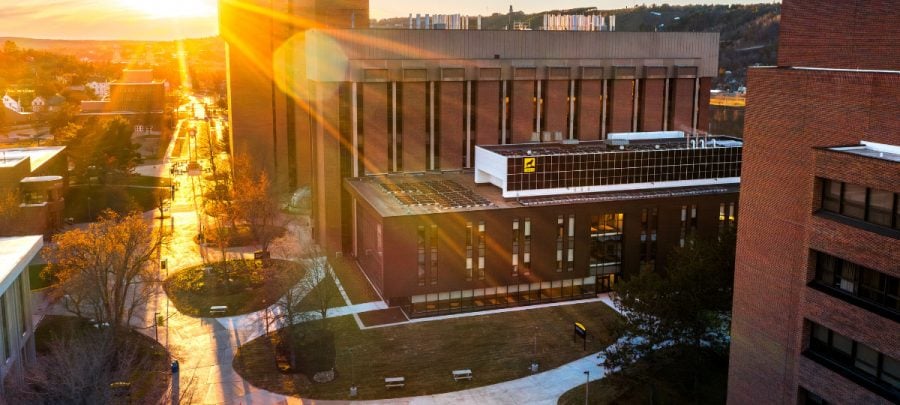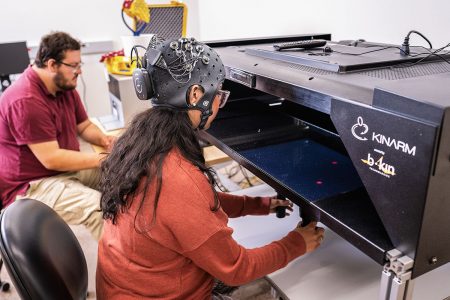
Michigan Tech’s psychology program celebrated its 20th anniversary in academic year 2024-25—and also marked its best year yet for research funding.
Psychology research at Michigan Tech embraces a wide variety of specialties and practical applications. One of the hallmarks of the program is how it intentionally engages undergraduate students in interdisciplinary research.
“Our faculty’s wide-ranging research is making an impact across multiple disciplines and in the real world, from transportation to AI to education,” said Kelly Steelman, chair of the Psychology and Human Factors Department at Michigan Tech. “I’m excited by our current projects and the opportunities they provide to engage our undergraduate and graduate students in groundbreaking research.”
Combined funded research in the department totals more than $2 million. Here’s a look at a few of the projects underway:
Doing the MOST in the Math Classroom
Shari Stockero, psychology and human Factors (PHF) professor, is currently collaborating on a newly funded project sponsored by the National Science Foundation. The project “Collaborative Research: Designing a Teacher Learning Sequence for Building on Mathematical Opportunities in Student Thinking” or “Learning to Build on MOSTs,” is a collaboration between Michigan Tech and Brigham Young University. It focuses on helping secondary school teachers build on mathematical opportunities in student thinking, or MOSTs, to develop mathematical concepts.
Engaging with important student ideas to develop the classes’ mathematical understanding is crucial to mathematics education, but is a challenging practice for teachers to learn and enact, said Stockero.
“It requires teachers to engage in complex, in-the-moment decision-making as they are carrying out a lesson because what students will say and do cannot be fully planned for in advance,” she said.
Tomorrow Needs Human Factors Professionals
Michigan Tech designed one of the first human factors bachelor’s degree programs in the United States to address innovation in education and research at the crossroads of psychology, engineering, and computing. Every student across the program’s four concentrations are involved in undergraduate research.
The research team is working on a way to unpack this complex teaching practice and develop a language for teacher educators to discuss this practice with teachers. The research involves designing and studying a sequence of learning activities to develop teachers’ ability to build on a MOST in their classrooms. The end result will be a set of professional development materials to help teachers leverage in-the-moment student thinking that surfaces during instruction. Stockero said that learning how to carry out the practice in a range of settings has the potential to improve classroom mathematics instruction and student learning.
Current project funding was awarded in November 2024 and continues through October 2028. The research team will work with three groups of teachers in year-long professional development workshops to test the materials: teachers in Utah in 2025-2026; in the Upper Peninsula in 2026-2027; and with a group from across the U.S. via online workshops in 2027-2028.
The research group has been exploring MOSTs since 2010. Research originally emerged when Stockero and her colleagues noticed that student teachers often missed key teachable moments, or focused on student ideas that were not mathematically productive. The original goal was to help teachers identify which student contributions were more productive to focus on. This later grew into studying teaching practices that best capitalized on those moments once teachers recognized them.
Psychology on the Railways
Psychology and Human Factors Professor Shane Mueller is principal investigator (PI) on the project “Lightweight Evaluation, Training, and User Collaboration for Human-AI work in Rail Systems.” The project goal is to develop, evaluate, and give recommendations on making users smarter about the automated systems they are using, with a special focus on intelligent systems and AI used in rail transportation.
Researchers are examining and evaluating six different approaches that rail operations companies and agencies can apply at different points in the technology development lifespan to offer users planning, evaluation, and support tools when working with new AI systems. The goal is to provide guidance for how rail operators and regulators should think about AI and intelligent software in their operations. By identifying and testing the effectiveness of various approaches throughout the lifespan of the system, they can help rail operators be smarter about the AI and automation tools they increasingly use.
“As AI systems emerge, it is difficult to know how they can benefit existing work,” said Mueller. “There are problems understanding how to integrate it into current work, evaluating whether the systems are working or effective, anticipating problems that will emerge, and training and supporting users once the system is being used.”
The project began in 2024 and will be completed in August 2026. It’s managed through the Michigan Tech Transportation Institute with co-PIs Elizabeth Veinott, PHF associate professor, and Pasi Lautala, College of Engineering professor and director of Michigan Tech’s Rail Transportation Program. Katrina Carlson and Anusha Kanan, applied cognitive science and human factors graduate students are also on the research team.
Mueller has been researching the intersection of humans and AI for almost 20 years, including a recent Defense Advanced Research Projects Agency (DARPA) program to help users understand how and why AI systems make a particular decision. Some of the early ideas for his current rail systems project were inspired by methods evaluated in that project, although Mueller explained this recent project goes “beyond the pure goal of explainability to help support all kinds of human-AI interaction goals.”
Supporting Student Engagement in Research
Research is essential to Michigan Tech’s psychology program, and not just for faculty. The department offers a two-semester research methods sequence where all undergraduate students conduct their own research projects from start to finish. Most are encouraged to take this sequence in their junior or senior year, although some second-year and even the occasional first-year students will take advantage of this research experience.
The unique opportunity is considered essential to students’ development within their field. Though not all students will choose a career in research, the sequence helps students learn to engage with, interpret, and present research to an array of audiences. In 2024, psychology student Lee Solo ’25 completed research titled “The Combined Effects of Extraversion and Method of Description on Desirability of Potential Romantic Matches” as part of a research sequence alongside former student Chloe Malinich.

Their research used AI-simulated dating profiles to investigate if people looking at the profiles were more drawn to the use of activities or the expression of personality for describing identical traits used to match potential candidates. Each description profiled either an extroverted or introverted person using either common activities or personality traits. Solo said responses from the study showed “the words you use to present yourself can have a large impact on your desirability in a first impression, depending on your personality type.”
“Doing hands-on research from start to finish and presenting it to other students and faculty was amazing,” said Solo. “My coursework was put into practice in a way that encapsulated my passion and interest in personality, while reinforcing many of the concepts and methods I’ve learned while earning my psychology degree at Michigan Tech.”
Solo, who is part of the spring 2025 graduating class, heads to the University of Michigan in Ann Arbor this fall to pursue their master’s degree in social work.
Exploring the Connections
As the variety in the funded research projects shows, psychology at Michigan Tech expands far beyond the stereotypical image of a psychologist providing personal counseling to a patient lying on a leather couch. While the counseling profession remains valid and valued, psychologists also play an integral role in informing human-centered technological designs. They study how people interact with technology and how technology can better serve people.
Psychology and Human Factors professionals strive to make technology work better for humans. Flexible psychology concentration options at Michigan Tech include clinical, cognitive, or social psychology as well as a wide variety of electives. Students within the department are always encouraged to seek out interdisciplinary opportunities. Huskies are challenged to explore where psychology fits in a modern, technological world—and may come to realize the real question is: “where doesn’t psychology fit in?”
About the College of Sciences and Arts
The College of Sciences and Arts is a global center of academic excellence in the sciences, humanities, and arts for a technological world. Our teacher-scholar model is a foundation for experiential learning, innovative research and scholarship, and civic leadership. The College offers 33 bachelor’s degrees in biological sciences, chemistry, humanities, kinesiology and Integrative physiology, mathematical sciences, physics, psychology and human factors, social sciences, and visual and performing arts. We are home to Michigan Tech’s pre-health professions and ROTC programs. The College offers 25 graduate degrees and certificates. We conduct approximately $12 million in externally funded research in health and wellness, sustainability and resiliency, and the human-technology frontier.
Follow the College on Facebook, Instagram, LinkedIn, X and the CSA blog. Questions? Contact us at csa@mtu.edu.